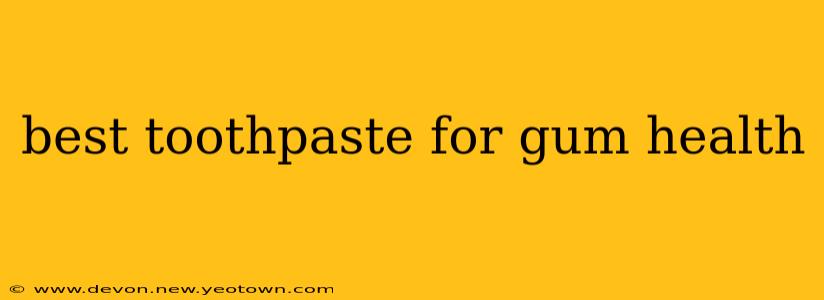The Quest for the Perfect Paste: Finding the Best Toothpaste for Gum Health
Let's be honest, nobody wants to deal with bleeding gums, swollen tissues, or the general discomfort of gum disease. A healthy smile starts with healthy gums, and choosing the right toothpaste is a crucial first step. But with so many options lining the shelves, how do you find the best toothpaste for gum health? This isn't just about sparkly teeth; it's about protecting your overall oral health. My journey to discover the ideal toothpaste began with a simple question – and a whole lot of research.
My gums had been feeling a little sensitive lately, nothing major, but enough to make me realize I needed to pay more attention to my oral hygiene routine. I started digging, exploring forums, consulting dentists' websites, and even reading some rather dense scientific papers (okay, maybe just skimmed them!). This quest led me down a path of understanding what really makes a toothpaste effective for gum health. What I discovered was fascinating, and I want to share it with you.
What Ingredients Should I Look For in Toothpaste for Gum Health?
This is the million-dollar question, isn't it? The answer isn't a simple "one-size-fits-all" solution, but rather understanding the key players and how they work together to promote healthy gums.
-
Fluoride: While often associated with cavity prevention, fluoride also plays a role in strengthening tooth enamel, which indirectly benefits gum health. Stronger enamel means less sensitivity and a reduced risk of gum recession caused by tooth decay.
-
Antibacterial Agents: These are the real heroes in the fight against gum disease. Look for toothpastes containing ingredients like triclosan (although its use is controversial and increasingly regulated), chlorhexidine (often found in prescription-strength mouthwashes, sometimes in toothpastes), or essential oils like those found in some therapeutic toothpastes. These agents help to combat the bacteria that cause plaque and gingivitis.
-
Anti-inflammatory Ingredients: Inflammation is the root of many gum problems. Some toothpastes contain ingredients with anti-inflammatory properties, such as chamomile or aloe vera. These can soothe irritated gums and reduce swelling.
-
Zinc Citrate: This ingredient is a popular addition in many toothpastes aimed at preventing gum disease. Studies suggest it may help to reduce gum inflammation and bleeding.
What About Natural Toothpastes? Are They Effective?
Many people are turning to natural toothpastes, often seeking alternatives to traditional formulas with potentially harsh chemicals. The effectiveness of natural toothpastes for gum health varies significantly. While some contain beneficial natural ingredients with anti-inflammatory properties, it’s crucial to ensure they contain fluoride for optimal protection against cavities and maintain good oral hygiene practices. Always check the label to see if it contains fluoride and other essential ingredients.
Does Whitening Toothpaste Harm My Gums?
Whitening toothpastes often contain abrasives to remove surface stains. While effective for whitening, excessive use of abrasive whitening toothpastes can wear away tooth enamel and potentially contribute to gum recession. It's vital to use whitening toothpastes sparingly and choose those with low abrasivity.
How Often Should I Change My Toothpaste?
There's no set timeframe for changing your toothpaste. If you find a toothpaste that works well for you and addresses your gum health concerns, there’s no need to switch frequently. However, you might consider trying different formulations to see if you find one with an improved formula, additional benefits, or a better taste and texture.
What if My Gums Are Already Bleeding?
Bleeding gums are a common sign of gingivitis, the early stage of gum disease. While a good toothpaste can help manage gingivitis, it’s crucial to consult a dentist if you experience persistent bleeding or other gum problems. They can diagnose the underlying issue and provide appropriate treatment.
My journey towards finding the "best" toothpaste for gum health led me to understand that there's no magic bullet. It's about finding a toothpaste that complements your oral hygiene routine and addresses your specific needs, while maintaining regular dental checkups. Remember, the best toothpaste is the one you use consistently and correctly.

